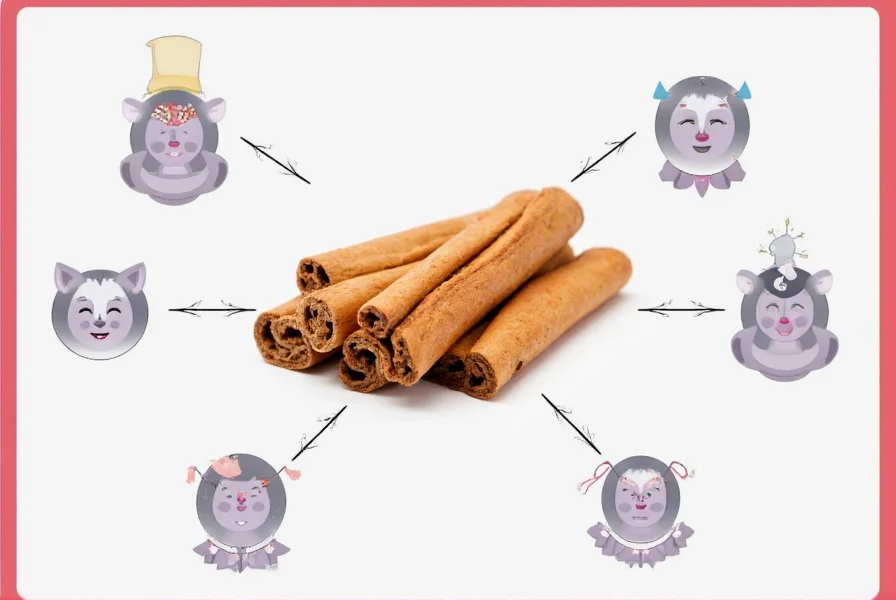Introducing spices to your infant's diet can add flavor and potential health benefits, but requires careful consideration. Cinnamon ranks among the safest spices for babies when used appropriately. This comprehensive guide provides evidence-based information for parents wondering about cinnamon and infants, covering safety guidelines, health considerations, and practical introduction methods.
Understanding Cinnamon Varieties for Infant Consumption
Not all cinnamon is created equal when it comes to infant nutrition. The two primary varieties differ significantly in chemical composition:
| Cinnamon Type | Coumarin Content | Recommended for Infants | Availability |
|---|---|---|---|
| Ceylon Cinnamon | Very low (0.017g/kg) | Preferred choice | Health food stores, specialty markets |
| Cassia Cinnamon | High (6.97g/kg) | Limited use only | Most grocery stores |
Coumarin, a natural compound found in higher concentrations in cassia cinnamon, can potentially cause liver issues when consumed in large amounts over time. While occasional small amounts of cassia cinnamon won't harm your baby, Ceylon cinnamon (often labeled "true cinnamon") represents the safer option for regular use in infant diets.
When to Introduce Cinnamon to Your Baby
The appropriate timing for introducing cinnamon aligns with general solid food introduction guidelines:
- Under 6 months: Avoid all spices including cinnamon. Breast milk or formula provides complete nutrition.
- 6-9 months: Begin with tiny amounts (less than 1/8 teaspoon) mixed thoroughly into purees or soft foods.
- 9-12 months: Gradually increase to 1/4 teaspoon as your baby shows tolerance.
- 12+ months: Up to 1/2 teaspoon daily is generally considered safe for most children.
Always introduce cinnamon separately from other new foods to properly monitor for potential reactions. The American Academy of Pediatrics recommends waiting 3-5 days between introducing new foods to infants.

Health Benefits of Cinnamon for Infants
When used appropriately, cinnamon offers several potential health benefits for growing babies:
- Digestive support: Cinnamon may help soothe infant digestive issues and reduce gas
- Natural antioxidant properties: Provides protection against free radicals
- Blood sugar regulation: May help maintain stable energy levels (though effects are minimal at infant consumption levels)
- Anti-inflammatory effects: Could potentially support immune system development
- Flavor development: Introduces complex taste profiles that may reduce picky eating later
Research published in the Journal of Agricultural and Food Chemistry confirms cinnamon's antioxidant properties, though infant-specific studies remain limited. Always remember that spices should complement—not replace—nutrient-dense whole foods in your baby's diet.
Safety Concerns and Precautions
While cinnamon offers benefits, parents should understand these important safety considerations:
Allergy Risk Assessment
Though rare, cinnamon allergies can occur. Watch for these symptoms after introduction:
- Skin rash or hives around the mouth
- Swelling of lips or face
- Vomiting or diarrhea
- Difficulty breathing (seek immediate medical attention)
Choking Hazard Prevention
Never give infants cinnamon in powder form. The fine particles pose a significant inhalation risk that could lead to respiratory issues. Always mix cinnamon thoroughly into foods like:
- Applesauce
- Oatmeal
- Yogurt
- Mashed sweet potatoes
Coumarin Content Management
The European Food Safety Authority recommends a maximum coumarin intake of 0.1mg per kilogram of body weight daily. For a typical 10kg (22lb) infant, this equals 1mg daily. Cassia cinnamon contains approximately 6970mg of coumarin per kilogram, while Ceylon contains only about 17mg per kilogram.
Practical Tips for Introducing Cinnamon
Follow these evidence-based recommendations when adding cinnamon to your infant's diet:
- Start with Ceylon: Choose "true cinnamon" (Ceylon variety) for lower coumarin content
- Proper measurement: Use no more than 1/8 teaspoon for initial introductions
- Thorough mixing: Blend completely into smooth purees to prevent concentrated spots
- Temperature check: Ensure cinnamon-infused foods aren't too hot before serving
- Consistent timing: Introduce new spices in the morning to monitor reactions throughout the day
Simple recipe idea: Mix 1/8 teaspoon Ceylon cinnamon into 4 ounces of unsweetened applesauce. This creates a flavorful, nutrient-rich food that most babies enjoy while staying within safe consumption limits.

When to Consult Your Pediatrician
While cinnamon is generally safe for most infants, consult your child's healthcare provider before introduction if:
- Your baby has known food allergies or sensitivities
- There's a family history of liver conditions
- Your infant has digestive issues like chronic constipation or reflux
- You're considering cinnamon for therapeutic purposes
- Your baby is premature or has other health complications
Pediatricians can provide personalized guidance based on your child's specific health profile and developmental stage. They may recommend allergy testing if concerns exist about potential cinnamon sensitivity.
Conclusion: Safe Cinnamon Practices for Infants
When introduced properly, cinnamon can safely enhance your infant's culinary experience while potentially offering health benefits. Remember to choose Ceylon cinnamon when possible, avoid powder forms, start with minimal amounts after 6 months of age, and watch for any adverse reactions. Always prioritize whole foods over spices in your baby's diet, using cinnamon as a flavor enhancer rather than a primary ingredient. By following these evidence-based guidelines for cinnamon and infants, parents can safely expand their baby's palate while supporting healthy development.
Frequently Asked Questions
Can cinnamon cause allergies in babies?
Cinnamon allergies in infants are rare but possible. Symptoms may include skin rash, swelling, or digestive upset. Introduce cinnamon separately from other new foods and watch for reactions over 3-5 days. If you notice any concerning symptoms, discontinue use and consult your pediatrician. Always mix cinnamon thoroughly into food rather than serving it as a powder to minimize potential irritation.
How much cinnamon is safe for a 7-month-old baby?
For a 7-month-old, start with no more than 1/8 teaspoon of Ceylon cinnamon mixed thoroughly into 4 ounces of food. This small amount allows you to monitor for any reactions while staying well below safety thresholds for coumarin exposure. Gradually increase to 1/4 teaspoon only after confirming your baby tolerates the initial amount without issues. Always consult your pediatrician for personalized recommendations based on your baby's specific health needs.
What's the difference between Ceylon and cassia cinnamon for babies?
Ceylon cinnamon ("true cinnamon") contains significantly less coumarin (about 0.017g/kg) compared to cassia cinnamon (about 6.97g/kg). Coumarin in high amounts can potentially affect liver function. For infants with developing systems, Ceylon cinnamon represents the safer choice for regular use. Ceylon has a lighter, sweeter flavor and tan-brown color, while cassia is darker, reddish-brown, and more commonly found in grocery stores. When purchasing for infant use, look for "Ceylon" on the label.
Can I give my 5-month-old cinnamon in their food?
No, you should not give cinnamon to a 5-month-old. Most pediatricians recommend waiting until at least 6 months before introducing spices like cinnamon, as this aligns with the appropriate time for starting solid foods. Before 6 months, breast milk or formula provides complete nutrition. Introducing spices too early may irritate your baby's developing digestive system. Wait until your pediatrician confirms your baby is ready for solid foods before considering cinnamon introduction.
Is ground cinnamon safe for babies?
Ground cinnamon poses a choking and inhalation risk for infants and should never be given in powder form. The fine particles can easily be inhaled, potentially causing respiratory irritation or even chemical pneumonitis. Always mix ground cinnamon thoroughly into smooth purees, oatmeal, or other soft foods to eliminate concentrated spots and prevent inhalation risk. Better yet, consider using cinnamon sticks to infuse flavor into cooking liquids, then removing the stick before serving to avoid any powder-related risks.











 浙公网安备
33010002000092号
浙公网安备
33010002000092号 浙B2-20120091-4
浙B2-20120091-4